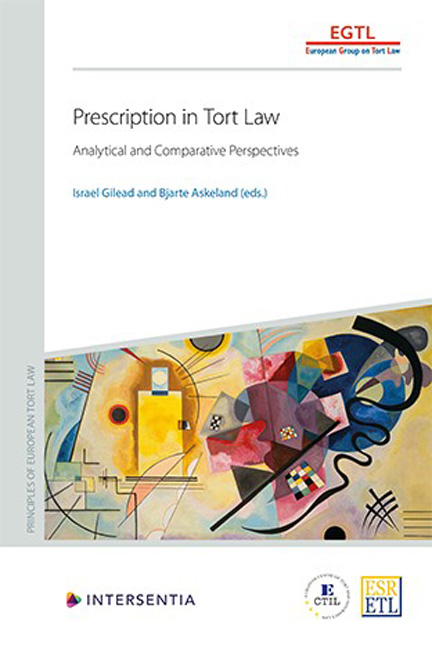Book contents
- Frontmatter
- Dedication
- Acknowledgements
- Contents
- List of Authors
- PART I THEORETICAL AND COMPARATIVE ANALYSES
- Analytical and Comparative Report
- Economic Analysis
- PART II PRESCRIPTION IN TORT LAW OUTLINED
- Case Scenarios
- Austria
- Belgium
- Czech Republic
- England and Wales
- France
- Germany
- Greece
- Italy
- The Netherlands
- Norway
- Poland
- South Africa
- Spain
- Switzerland
- United States
- European Union
- Appendix: Questionnaire
- About the Editors
England and Wales
Published online by Cambridge University Press: 22 December 2020
- Frontmatter
- Dedication
- Acknowledgements
- Contents
- List of Authors
- PART I THEORETICAL AND COMPARATIVE ANALYSES
- Analytical and Comparative Report
- Economic Analysis
- PART II PRESCRIPTION IN TORT LAW OUTLINED
- Case Scenarios
- Austria
- Belgium
- Czech Republic
- England and Wales
- France
- Germany
- Greece
- Italy
- The Netherlands
- Norway
- Poland
- South Africa
- Spain
- Switzerland
- United States
- European Union
- Appendix: Questionnaire
- About the Editors
Summary
INTRODUCTION
The limitations statutes we are familiar with today are rooted in the limitation periods of 13th-century land-related actions in England. It was not until the Limitation Act 1623, however, that the notion was extended to non-land-related claims, including torts. Under that Act, limitation periods of two years for actions on the case for words, four years for actions of assault and false imprisonment and six years for most other actions were introduced. The law of limitations was left virtually undisturbed until Parliament enacted a single limitation period of six years under the Limitation Act 1939 from when the cause of action in tort and contract, but not on a specialty, accrued. Parliament intervened more frequently thereafter among other things to reduce the limitation period for personal injury claims to three years (under Law Reform (Limitation of Actions, etc) Act 1954); to introduce an alternative period which commenced, in personal injury actions, when ‘material facts‘ were known to the claimant (under the Limitation Act 1963); and to legislate for judicial discretion to set aside the ordinary time limit in personal injuries cases (under the Limitation Act 1975). The current principal piece of legislation on the subject, the Limitation Act 1980, entered into force on 1 May 1981 and applies in England and Wales only. As its Preamble notes, the statute is:‘An Act to consolidate the Limitation Acts 1939 to 1980̓. Important amendments have since been made to the Limitation Act 1980, for our purposes, by the Latent Damage Act 1986 (which is also limited in its application to England and Wales), the Consumer Protection Act 1987 (which applies across the UK), the Administration of Justice Act 1985 and the Defamation Act 1996 (which applies to the whole of the UK with the exception of Scotland).
Part I of the Limitation Act 1980 (secs 1– 27C) sets the ordinary time limits for different classes of action. However, the latter may qualify for extension or exclusion in accordance with provisions under Part II of the Act (secs 28– 33B). Miscellaneous and general provisions are contained in Part III (secs 35– 41). By virtue of sec 37 of the Limitation Act 1980, actions involving the Crown are generally dealt with in the same way as those between private subjects. .
- Type
- Chapter
- Information
- Prescription in Tort LawAnalytical and Comparative Perspectives, pp. 243 - 308Publisher: IntersentiaPrint publication year: 2020



